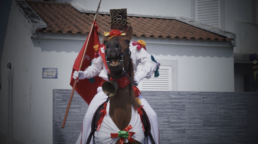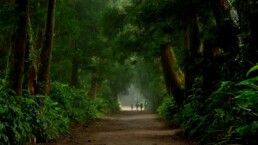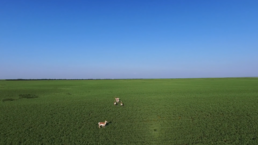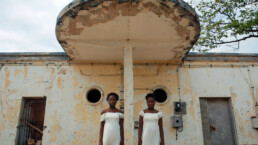FUSO INSULAR 2022 – 27 a 30 de Outubro
29 Outubro, 18h30
Arquipélago – Centro de Artes Contemporâneas, Ribeira Grande
CICLO DE CINEMA DE AUTOR
Curadoria: Fuso Insular
O Cinema de Autor é uma categoria de produção cinematográfica que valoriza, acima de tudo, a visão e expressão artística do autor. Uma de suas características distintivas é o respeito pela sua liberdade criativa. O FUSO INSULAR está empenhado em promover o cinema independente, convidando artistas com larga experiência na área da imagem em movimento a filmar na ilha de São Miguel. As obras resultantes deste encontro do realizador com as paisagens e as pessoas desta ilha oferecem um novo olhar e um novo discurso que enriquecem o património artístico dos Açores.
Para a edição de 2022 o artista convidado é Yuri Firmeza, cuja obra testa as fronteiras entre a ficção, o possível e o real. Durante um mês em residência artística na ilha de São Miguel, Firmeza realizou Agapanto Sísmico, título do filme que tem estreia absoluta no Ciclo de Cinema de Autor. Tendo como ponto de partida um festejo popular – as tradicionais Cavalhadas de São Pedro – Firmeza propõe uma ficção especulativa sobre a relação entre este santo padroeiro, um desastre natural (a imagem de S. Pedro e a igreja a que deu o nome saíram ilesas da erupção vulcânica ocorrida no Pico do Sapateiro no século XVI), o passado colonial, a religiosidade e a (re)encenação das cavalhadas para o tempo presente.
Outro filme de Yuri Firmeza a ser exibido neste ciclo, Nada É (2014), foi rodado em Alcântara (MA), cidade no norte do Brasil marcada pela presença açoriana. Nada É foi buscar o seu título ao que uma habitante de Alcântara disse ao realizador: aqui nada é – tudo foi ou será. No século XIX, a elite local construiu palacetes aguardando a visita do imperador D. Pedro II, que prometeu, mas nunca foi à cidade. Com o tempo, os palácios tornaram-se ruínas. O passado, o que foi. O que será é o futuro.
Alcântara abriga uma base de lançamento de foguetões para o espaço. Yuri Firmeza tudo mistura. As ruínas, os foguetões e a Festa do Divino Espírito Santo, durante a qual é coroado o imperador-menino, evocando D. Pedro e sua corte.
Queremos ressalvar que os artistas convidados a realizar e apresentar seus filmes no Ciclo de Cinema de Autor são também os responsáveis pela componente teórica do Laboratório Imagem em Movimento, ministrando masterclasses para os participantes do Programa de Residência Criativa do FUSO INSULAR.
AGAPANTO SÍSMICO – Yuri Firmeza
Uma erupção vulcânica, um acto de fé nas Cavalhadas de São Pedro, o império reencenado e as tecnologias de monitorização da natureza entrecruzando-se num gesto de síntese não reducionista.
Direcção: Yuri Firmeza
Produção Executiva: António Câmara Manuel e Rachel Korman
Produção: Diana Diegues
Fotografia: André Laranjinha
Som: Adriana Bolito
Montagem e cor: Ian Capilé
Edição de som e mistura: Alexandre Franco
NADA É – Yuri Firmeza
Filme realizado em Alcântara (MA), cidade no Norte do Brasil, durante a festa do Divino Espírito Santo. Alcântara é cultural e historicamente marcada pela presença açoriana – a culinária, os festejos, a música e a arquitectura. É em Alcântara que se localiza o CLA (Centro de Lançamento de Alcântara), base militar brasileira responsável pelo lançamento de satélites para o espaço. A cidade – que conta com a maior comunidade de Quilombolas* que remanescem no Brasil – é hoje, tal como no passado, foco de interesses e disputas internacionais. O filme constrói uma narrativa sobre as histórias e as camadas temporais de tais disputas.
Concepção e direcção: Yuri Firmeza
Fotografia: Victor de Melo
Som: Danilo Carvalho
Assistente de direcção: Giancarlo Maia
Produção: Camila Battistetti
Assistente de Produção: Lohayne Lima
Mixagem: Érico Paiva
Montagem, Desenho Sonoro e Finalização: Frederico Benevides
* Quilombolas são um grupo étnico organizado em quilombas, denominação das comunidades de escravos negros que resistiram ao regime esclavagista que prevaleceu no Brasil desde meados dos anos 1500 (abolido em 1888). Dados do governo indicam que em 2020 havia cerca de 6000 quilombos espalhados por todas as regiões do país, do sul do Brasil à Amazónia.
[fontes: Comissão Pró-Índio de São Paulo; Base de Informações Geográficas e Estatísticas do IBGE sobre Indígenas e Quilombolas]
FUSO INSULAR 2022 – October 27th to 30th
October 29th, 6.30pm
Arquipélago – Centro de Artes Contemporâneas, Ribeira Grande
INDEPENDENT FILM SCREENINGS
Curator: Fuso Insular
Independent cinema is a category that highlights a filmmaker’s personal artistic vision and expression. One of its distinguishing features is the respect for the freedom of the director. FUSO INSULAR is committed to promoting independent cinema by inviting experienced and renowned directors to shoot on the island of São Miguel, resulting in films that reflect their personalities and singular views of the world around them.
For the 2022 edition the invited artist is Yuri Firmeza, whose work stretches the boundaries between fiction, the possible and the real. Firmeza directed Agapanto Sísmico during a month-long artistic residence on the island of São Miguel. The film has its world première in the ambit of this programme organized by FUSO INSULAR. Based upon a popular celebration — the traditional Cavalhadas de São Pedro —, Firmeza proposes a speculative fiction based on the relation of this patron saint with a natural disaster (the saint’s image and the church of São Pedro came out unscathed from the volcanic eruption that occurred at Pico do Sapateiro in the sixteenth century), the colonial past, and religiosity, (re)staging the Cavalhadas for the present time.
Another film by Yuri Firmeza, Nada É (2014), shot in Alcântara (MA), a city in the North of Brazil that has a strong Azorean influence, is also screened in this programme.
Nada É (Nothing Is) takes its title from something that an inhabitant of Alcântara said to the filmmaker: here nothing is – everything was or will be. In the 19th century, the local elite built some palaces awaiting the visit of emperor D. Pedro II, who promised to go to the city but never did. The palaces turned to ruins. In Alcântara there is also a Space Launch centre. Yuri Firmeza mixes the past and future, the ruins, the rockets and the festivities of the Holy Spirit, during which the boy emperor is crowned, invoking
D. Pedro and his court.
It is important to emphasize that the artists invited to make and present their films in FUSO INSULAR Independent Film Screenings are also responsible for the theoretical component of the Moving Image Laboratory, teaching masterclasses to the participants of the Creative Residency Program.
SEISMIC AGAPANTHUS – Yuri Firmeza
A volcanic eruption, an act of faith at Cavalhadas de São Pedro, the empire re-enacted, and the technologies of monitoring nature intersected, in a non-reductionist gesture of synthesis.
Direction: Yuri Firmeza
Executive production: António Câmara Manuel and Rachel Korman
Production: Diana Diegues
Photography: André Laranjinha
Sound: Adriana Bolito
Editing and colour grading: Ian Capilé
Edição de som e mistura: Alexandre Franco
NADA É (NOTHING IS) – Yuri Firmeza
The film was made in Alcântara (MA), a city in the North of Brazil, during the festivities of the Holy Spirit. Alcântara is culturally and historically marked by the Azorean presence – the gastronomy, the festivities, the music, and the architecture. It is in Alcântara that the Alcântara Space Launch Center (CLA) is located, a Brazilian military base responsible for launching satellites into space. The city — which accounts for the largest community of Quilombolas * in Brazil — is today, as before, a focus of international interests and disputes. The film weaves, in its narrative, the stories and their temporal layers that derive from such disputes.
Concept and direction: Yuri Firmeza
Photography: Victor de Melo
Sound: Danilo Carvalho
Assistant to the director: Giancarlo Maia
Production: Camila Battistetti
Production assistant: Lohayne Lima
Mixing: Érico Paiva
Editing, sound design and final cut: Frederico Benevides
* Quilombolas are an ethnic group organized in quilombos, the denomination for communities of black slaves who resisted the slavery regime that prevailed in Brazil since the mid-1500s (abolished in 1888). Data from the Government indicates that in 2020 there were around 6000 quilombos spread across all regions of the country, from southern Brazil to the Amazon.
[sources: Comissão Pró-Índio de São Paulo; Base de Informações Geográficas e Estatísticas sobre os Indígenas e Quilombolas do IBGE]




